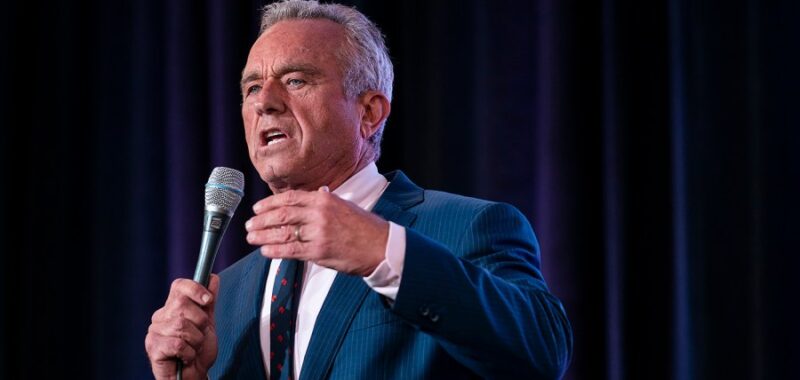
Michigan and Wisconsin, two key battleground states, declined to remove former Independent candidate Robert F. Kennedy Jr.’s name from their general election ballots this November despite his requests and withdrawal from the race.
Kennedy announced last Friday that he was suspending his presidential campaign and would endorse former President Trump.
He said he would seek to remove his name from the ballots in states that could theoretically determine the outcome of the election but would keep his name on ballots that are either solidly Democrat or solidly Republican.
The critical purple states, however, rejected that effort Tuesday.
“Minor party candidates cannot withdraw, so his name will remain on the ballot in the November election,” Cheri Hardmon, senior press secretary for Michigan Secretary of State Jocelyn Benson, told Axios in a statement Tuesday.
Kennedy is slated to appear on the Michigan ballot as the nominee of the Natural Law Party.
“The Natural Law Party held their convention to select electors for [Kennedy]. They cannot meet at this point to select new electors since it’s past the primary,” Hardmon added in the statement.
Hardmon has not responded to a request for comment.
Wisconsin similarly decided Tuesday it was too late for a change. The Wisconsin Elections Commission, after first deadlocking on the issue, voted 5-1 to keep Kennedy’s name on the ballot. Officials pointed to the state law that says unless a candidate dies, they must remain on the ballot after filing for office, The Associated Press reported.
During the proceedings Tuesday, according to NBC News, the chair of the commission, Ann Jacobs, quoted the state law to another commissioner who had concerns about keeping Kennedy on the ballot, despite his request otherwise.
“The statute literally says, ‘Any person who files nomination papers and qualifies to appear on the ballot may not decline nomination. The name of that person shall appear upon the ballot except in case of death of the person,'” Jacobs said, according to the news outlet, which cited an archived recording of the proceedings.
“You’re giving me this touchy-feely: ‘I feel like this shouldn’t be the law.’ The law in this case is crystal clear,” Jacobs added. “I don’t disagree with you — it’s weird, but I don’t see we have any discretion here.”
The Hill has reached out to the commission for comment.
While Kennedy’s withdrawal from the race has not dramatically changed the 2024 presidential race on a national scale, the decision does have the potential to move the needle in certain states where the margin is already so slim.
According to The Hill/Decision Desk HQ’s polling average in Michigan, a three-way match-up has Vice President Harris (45.5 percent) leading Trump (42.5 percent) by 3 points, with Kennedy getting 5 percent.
Without Kennedy, however, Harris’s lead in Michigan shrinks to 2.3 points, with 48.4 percent to Trump’s 46.1 percent — suggesting Kennedy’s presence on the ballot would give a slight boost to Harris.
The Wisconsin polling average, in hypothetical three-way match-ups, shows Harris (47.2 percent) leading Trump (42.9 percent) by 4.3 percentage points. Kennedy gets 4.3 percent.
Without Kennedy, in Wisconsin’s head-to-head match-ups, Harris’s lead over Trump shrinks to 3 percentage points. She would get 49.3 percent, and Trump would get 46.3 percent.
The Hill has contacted Kennedy’s and Trump’s teams for comment.

